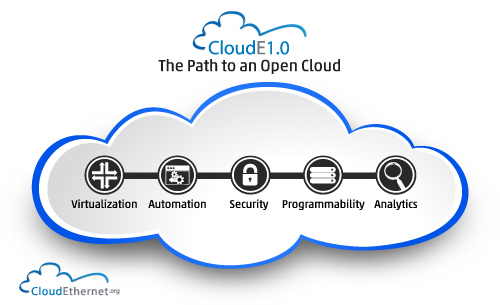The CloudEthernet Forum (CEF) and MEF have recently announced the creation of the CEF ‘Open Cloud Project.’ The Open Cloud Project will focus on creating an open test and iterative standards development program for service providers, industry vendors and over-the-top (OTT) cloud service providers.
The Open Cloud Project includes a dedicated proof of concept test laboratory based in Silicon Valley, to provide ongoing testing and support for the iterative development of the CEF’s CloudE 1.0 open cloud environment. It will also provide the basis of future compliance and benchmark testing. Informed by the experience and learning of its close association with the MEF, and seeing the benefits that rapid, iterative development has brought to the cloud industry, the CEF is taking this pioneering step of integrating testing into the standards development process right from the start.
The Open Cloud Project will focus on creating an open test and iterative standards development program for service providers, industry vendors and over-the-top (OTT) cloud service providers.
Our Initial work will be focused on three areas: application performance management, cloud security and traffic load balancing. The project’s open test program will lay the groundwork for a fully inter-working cloud environment, and the advancement of best practices to manage OTT and cloud services.
This is vitally important work if we are to avoid fragmentation of the cloud. Cloud services rely on the end to end interoperability of so many players – enterprises, network and datacenter equipment vendors, datacenter operators, orchestration layers, management and reporting platforms, security devices, network service providers – the list goes on. The MEF has shown a successful model of defining service types and attributes which everyone can agree to and align with, which through this test bed we can adapt and bring to the cloud industry.
This is vitally important work if we are to avoid fragmentation of the cloud.
Unless we can define industry best practices and global standards to establish an open cloud environment, cloud services run the risk of becoming more and more fragmented and difficult to integrate.
We have already started work on defining a reference architecture for cloud interoperability, including discussion with other standards bodies to make sure that work is aligned. The aim this year is to decide the initial, fundamental criteria for a set of standardised, open and interoperable cloud specifications called “CloudE 1.0”. The lab will play a key role in this development, ensuring faster establishment of workable and proven open standards.
Ask yourself, what are the basic standards that need to be met for a workable Cloud Ethernet service? For example, a car is not a car without certain basic components – wheels, engine, steering etc. – so the industry must decide a set of vendor-neutral networking criteria without which cloud services cannot realistically be supported. This is a co-operative process – we’re recruiting the brightest brains and most experienced practitioners to lead each of our five fundamentals, because we need to address the challenges with full 360 degree vision.
For more information, and detail of how to join the Forum, please visit: www.CloudEthernet.org
Head of #Digital #Innovation @CompareTheCloud - Every Day #Creating #SilverLinings.



Comments are closed.